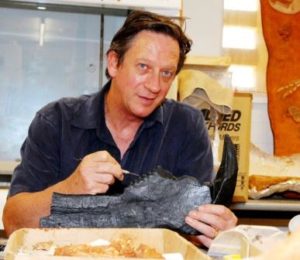 He has rewritten the history of evolution, is the author of 27 popular and academic science books for adults and children and even appears in the Guinness Book of Records – and he is now based at Flinders University.
He has rewritten the history of evolution, is the author of 27 popular and academic science books for adults and children and even appears in the Guinness Book of Records – and he is now based at Flinders University.
In a major coup, distinguished Australian palaeontologist John Long (pictured) – who five years ago made headlines around the world when he and his team found that an ancient fish gave birth to live young – has been appointed Strategic Professor of Palaeontology in the School of Biological Sciences.
The perfectly preserved embryo and umbilical cord he discovered within the fossilised remains of a placoderm, a 380-million-year-old armour-plated fish that is probably ancestral to both sharks and bony fish of today, was evidence of the oldest live birth on Earth.
“That told us that these fish had internal fertilisation. In other words, they were copulating; they were reproducing by sexual intercourse,” Professor Long, who comes to Flinders after three years as Vice President of Research and Collections at the Natural History Museum of Los Angeles County, said.
“Never before had there been any indication or hint of their reproductive ability. We just assumed these things would have spawned in water like trout and most fish do today,” he said.
It represented not only a whole new species – Materpiscis attenboroughi, named after the popular wildlife presenter Sir David Attenborough – but a high point in the almost 30 years that Professor Long has devoted to unearthing Devonian fish fossils in the Gogo region of Western Australia.
It also resulted in the publication of three major papers in the prestigious journal Nature within a 16 month period.
“It was a real paradigm shifting discovery for palaeontology because, usually, we think about bones, we study teeth and bones and skeletons and we can infer a little bit about environment or about the habit of the fish: but rarely do we get a window into behaviour,” Professor Long said.
“This was such a big discovery because it opened up this whole field of research into reproductive behaviour and its origins,” he said.
Professor Long’s latest books – The Dawn of the Deed: The Prehistoric Origins of Sex and Hung like an Argentine Duck: A Journey Back in Time to the Origins of Sexual Intimacy – are the most recent examples of his dedication to understanding “how the basic vertebrate body plan was assembled”.
“When you look at any part of the human body plan or any of our skeletal systems…90 per cent goes back to Devonian fishes. The origin of skulls, jaws, teeth; the origin of paired limbs, chambered hearts, paired lungs – all of that first originated in fishes back in the Devonian period.
“After that, these innovations began to build up what would become the standard vertebrate body plan for land animals that then went right through evolution to us.”
Professor Long said his role was to build a new palaeontology laboratory (which would make use of cutting-edge technologies such as synchrotron, micro-CT and isotopic analysis) and a team at Flinders that would pursue a number of fossil sites throughout Australia which have world-class early fossil deposits.
“We have a wonderful opportunity to make really major internationally significant discoveries by revisiting a number of these sites and developing new ways to prepare the fossils out of rock,” he said.


Professor Long’s lecture in the Vertebrate Palaeontology topic this month was extremely interesting, I’ve never found myself so interested in fish before now.